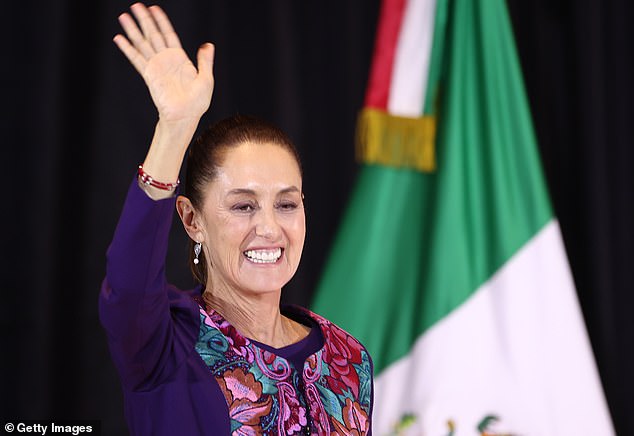On a recent, blustery evening at the Oval I found myself among a group of South African finance executives who had moved HQ from Johannesburg to London.
As early results came in from Africa’s most sophisticated nation showing the post-Mandela era of African National Congress rule was endangered, there was huge anxiety about what that would mean for the country’s fragile economy.
If the ANC were to align itself with the progressive parties of the Left then free markets, including dealing on the vibrant Johannesburg Stock Exchange, could be threatened. A better choice was seen as a coalition or working deal with the centrist Democratic Alliance, the successor to the anti-apartheid Progressive Party.

Mexican wave: Claudia Sheinbaum will hope to build exports to US
Elections in three of the world’s largest emerging markets – India, South Africa and Mexico – have each, in their own way, produced unexpected results.
They have shown democracy to be alive and well on three continents. They also offer the prospect of revived investment opportunities in a world torn apart by conflict, geopolitics, fragmented trade and diminishing buying opportunities.
India has long offered the most intriguing possibilities. China’s fall from grace in Western chanceries has revived interest in South Asia. A UK frustration has been failure to secure a British-India free trade deal.
The Hindu nationalist BJP, led by Narendra Modi, dramatically failed to secure the 273 majority which would allow it to rule alone.
The loss of control by the BJP led to a £1.2 billion sell-off as the results became known. Indeed in the last month some £3.4 billion of value has been wiped out. But some analysts see a silver lining.
In a government more inclusive of opposition voices there may be less focus on nationalism and more chance of spreading the benefit of a dynamic 7 per cent growth rate. Nonetheless, the Indian market premium, achieved as a result of government stability, is dissipating. Global fund managers are likely to hold off and bosses of the world’s leading financial groups, who have flocked to Mumbai in recent times, may take a breather.
But many remain underweight in Indian investments. And it is possible that – in an effort to shore up confidence – restrictions could be eased on foreign funds.
In contrast to South Africa and India, the result in Mexico has, if anything, strengthened the hold of the ruling party. The landslide victory of Nobel-prize winning scientist Claudia Sheinbaum, the country’s first female president, produced optimistic headlines and images in the Western Press. She promises a government ‘honest, without influence and corruption’.
Markets were less happy and the peso plunged with the key stock market index falling 5 per cent.
With a population of 130 million and membership of the US-Mexico-Canada trade group, the country is the second-largest economy in Latin America after Brazil and the 15th largest in the world. Sheinbaum wants to continue the pro-worker, populist policies of President Andres Manuel Lopez Obrador. But as the Right-wing US Heritage Foundation noted, it will take more than fine words to end a ‘dangerous course that has empowered drug cartels and brought skyrocketing overdoses and uncontrolled migration to the US’.
Mexico should be well placed to benefit from its proximity to the US and the efforts by American multinationals to disentangle production from China.
Last year Mexico overtook China as the biggest exporter to the US, selling $593 billion (£474 billion). But inward investors are wary, knowing the strength of cartels and widespread extortion and protection rackets. Overcoming such ingrained obstacles will be tricky.
Amid the furore of Britain’s own Election campaign and this weekend’s elections to the European Parliament, with fears of a right wing sweep, attention on the South African, Indian and Mexican outcomes has been scant, and market reaction broadly negative.
In the long run, the triumph of moderation in India and South Africa should be a force for economic stability and expansion, and a net plus for inward investment. Mexico’s struggle with violence makes its future an enigma.
But the significance of three of the new world powers to global output and investment should not be ignored.



